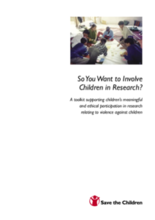When asked what issues are important to them, children frequently identify violence as a priority. The UN Study on violence against children concept paper (7 July 2003) draws attention to the need to emphasise children’s own definitions of violence, and to highlight strategies developed by children themselves to confront violence. Participatory approaches thus have much to contribute to the Study, which, for example, includes the identification of prevention strategies and interventions designed by children themselves.
Violence against children is obviously a challenging area to research. Much violence towards children takes place in ‘private’ settings such as the family, or in institutions which resent outside scrutiny such as schools and institutions for children without family support. Clearly a high level of attention to ethical issues will be necessary, to avoid causing further harm to children. Another challenge is that violence against children may be taken for granted, not questioned, by children as well as by adults. Some kinds of violence, such as sexual abuse, carry a particularly heavy load of stigma for those reporting it. Feelings of shame can inhibit sharing of experience. All these issues need to be carefully negotiated in planning research – and children can help adult researchers in working out positive approaches to overcoming these difficulties.
This research kit is part of Supporting children’s meaningful and ethical participation in work around violence against children: A toolkit produced by Save the Children for the UN study, which includes a second toolkit giving guidance on consultation: So you want to consult with children? A toolkit of good practice. It draws heavily on Save the Children’s experiences of children’s participation in the UN General Assembly Special Session on Children and aims at encouraging and facilitating children’s involvement in regional and other consultations that will be part of the UN Study.
This part of the toolkit aims to encourage meaningful and ethical participation by children in research related to violence against children. It promotes research that sees children as active agents in their own lives, not passive victims or research ‘subjects’. There are many ways in which children can be more actively involved in research, both as respondents and as co-researchers. This kit aims to give guidance on ways of approaching this work, on ethical issues to be considered, and on techniques that can be used.
©Save the Children

